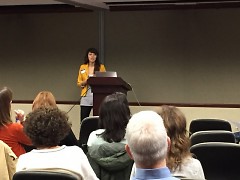Cultivating solutions to food insecurity is far from a single-organization job.
It requires a community of activists for the good food system.
On Tuesday, April 11, Access of West Michigan hosted the Food Justice Training event to promote greater awareness of "good food system" values. In attendance were 45 members and leaders of local organizations working together to work toward food security. Organizations represented included United Church Outreach Ministries, World Renew, United Way, Hope Farms, Kids’ Food Basket and many others.
The morning began with a presentation on the definitions of food justice, food security and environmental sustainability. Jeff Smith from the Grand Rapids Institute for Information Democracy provided valuable information on the facts and definitions to be aware of in promoting a sustainable food system.
Following was a session designed to encourage collaboration as attendees gathered in small groups to discuss the question of “Where do you see the concepts of food justice and food sovereignty at work in our community and your organization?”
During this time, the room was filled with meaningful conversation as each shared their own particular experience in an effort to contribute in the larger community.
After personal connections through small groups, Emma Garcia, co-executive director at Access of West Michigan, provided an eye-opening history of charitable food and the issues faced because of it.
The model of charitable food, she said, “was a simple formula: take unused food and give it to people who need it.”
However, she also noted how this model leads to distributing food as transactional, reactionary, relief-oriented and need-based.
Her solution: “redefine what the real issues are behind food insecurity,” she said. “The problem is not simply hunger, and the solution is not just throwing food at it and hoping the problem goes away.”
After a few interactive activities, including identifying brand names and cereal boxes, the session focused on the “what’s next?” steps of what to do with all of the information from the morning.
Group discussions again were the right method, as each voice could be heard. In small groups, participants worked together to develop goals, both personally and as a community, in working to address issues of food justice.
One question raised in the session included, “outside of your organization, what are ways that you can affect policy and structure to change food system?”
Both Access staff and attendees came away with essential information in how to put ideas into action at their respective organizations.
“It’s not just good food work but also in other facets of our community,” Erin Skidmore, Good Food Systems coordinator at Access of West Michigan, said. “Everything touches food. And with participation in the hunger walk, we’re trying to change the conversation about charitable food.”
Maddee Render, intern at Access of West Michigan, also attended the event. For her, the small group discussions were intriguing.
“We talked about the importance of encouraging community-supported agriculture and small farms as a means to redistribute some of this power,” she said. “We also discussed the concept of food justice, whereby one participant suggested when going to make a purchase ask, ‘who had to suffer for me to eat this?’”
Conversations like these are what can redefine the food insecurity problem and promote a thriving food system.
By Ellie Walburg, communications intern at Access of West Michigan
The Rapidian, a program of the 501(c)3 nonprofit Community Media Center, relies on the community’s support to help cover the cost of training reporters and publishing content.
We need your help.
If each of our readers and content creators who values this community platform help support its creation and maintenance, The Rapidian can continue to educate and facilitate a conversation around issues for years to come.
Please support The Rapidian and make a contribution today.


